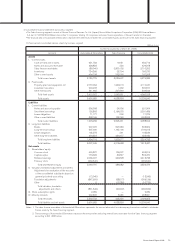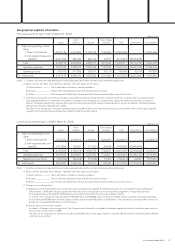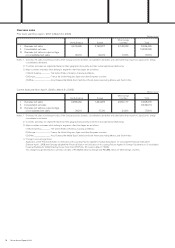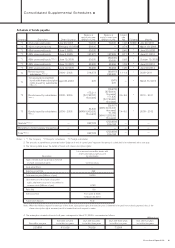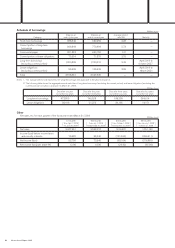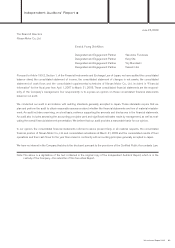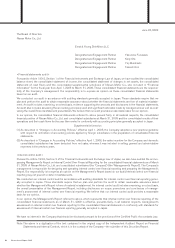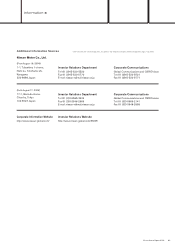Nissan 2009 Annual Report Download - page 86
Download and view the complete annual report
Please find page 86 of the 2009 Nissan annual report below. You can navigate through the pages in the report by either clicking on the pages listed below, or by using the keyword search tool below to find specific information within the annual report.
84 Nissan Annual Report 2009
The Board of Directors
Nissan Motor Co., Ltd.
Ernst & Young ShinNihon LLC
Designated and Engagement Partner Yasunobu Furukawa
Designated and Engagement Partner Kenji Ota
Designated and Engagement Partner Yoji Murohashi
Designated and Engagement Partner Takeshi Hori
<Financial statements audit>
Pursuant to Article 193-2, Section 1 of the Financial Instruments and Exchange Law of Japan, we have audited the consolidated
balance sheet, the consolidated statement of income, the consolidated statement of changes in net assets, the consolidated
statement of cash flows and the consolidated supplemental schedules of Nissan Motor Co., Ltd. included in “Financial
Information” for the fiscal year from April 1, 2008 to March 31, 2009. These consolidated financial statements are the responsi-
bility of the Company’s management. Our responsibility is to express an opinion on these consolidated financial statements
based on our audit.
We conducted our audit in accordance with auditing standards generally accepted in Japan. Those standards require that we
plan and perform the audit to obtain reasonable assurance about whether the financial statements are free of material misstate-
ment. An audit includes examining, on a test basis, evidence supporting the amounts and disclosures in the financial statements.
An audit also includes assessing the accounting principles used and significant estimates made by management, as well as eval-
uating the overall financial statement presentation. We believe that our audit provides a reasonable basis for our opinion.
In our opinion, the consolidated financial statements referred to above present fairly, in all material respects, the consolidated
financial position of Nissan Motor Co., Ltd. and consolidated subsidiaries at March 31, 2009 and the consolidated results of their
operations and their cash flows for the year then ended in conformity with accounting principles generally accepted in Japan.
Supplemental Information
(1) As described in “Changes in Accounting Policies,” effective April 1, 2008, the Company adopted a new practical guideline
with respect to unification of accounting policies applied by foreign subsidiaries in the preparation of consolidated financial
statements.
(2) As described in “Changes in Accounting Policies,” effective April 1, 2008, the sales incentive for the Company and domestic
consolidated subsidiaries has been deducted from net sales, whereas it was included in selling, general and administrative
expenses in the previous years.
<Internal control audit>
Pursuant to Article 193-2, Section 2 of the Financial Instruments and Exchange Law of Japan, we also have audited the accom-
panying Management’s Report on Internal Control Over Financial Reporting for the consolidated financial statements as of March
31, 2009 of Nissan Motor Co., Ltd. and consolidated subsidiaries (the “Company”) (the “Management’s Report”). The Company’s
management is responsible for designing and operating internal control over financial reporting and preparing the Management’s
Report. Our responsibility is to express an opinion on the Management’s Report based on our audit. Internal control over financial
reporting may not prevent or detect misstatements.
We conducted our internal control audit in accordance with auditing standards for internal control over financial reporting gener-
ally accepted in Japan. Those standards require that we plan and perform the audit to obtain reasonable assurance about
whether the Management’s Report is free of material misstatement. An internal control audit includes examining, on a test basis,
the overall presentation of the Management Report, including disclosures on scope, procedures and conclusions of manage-
ment’s assessment of internal control over financial reporting. We believe that our internal control audit provides a reasonable
basis for our opinion.
In our opinion, the Management’s Report referred to above, which represents that internal control over financial reporting of the
consolidated financial statements as of March 31, 2009 is effective, presents fairly, in all material respects, management’s
assessment on internal control over financial reporting for the consolidated financial statements in conformity with standards for
assessment of internal control over financial reporting generally accepted in Japan.
We have no interest in the Company that should be disclosed pursuant to the provisions of the Certified Public Accountants Law.
Note: The above is a digitization of the text contained in the original copy of the Independent Auditors’ Report on Financial
Statements and Internal Controls, which is in the custody of the Company—the submitter of this Securities Report.
June 23, 2009



